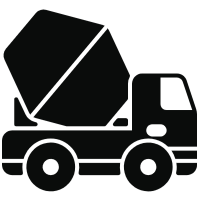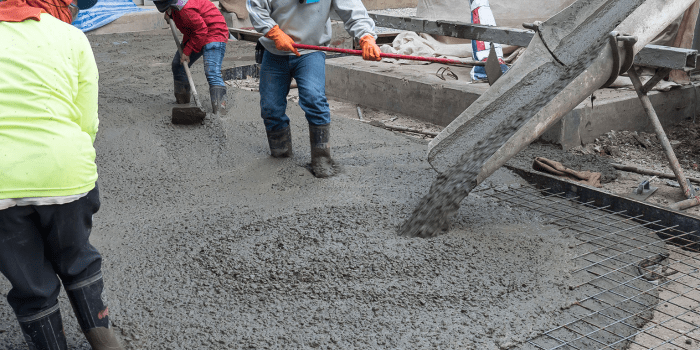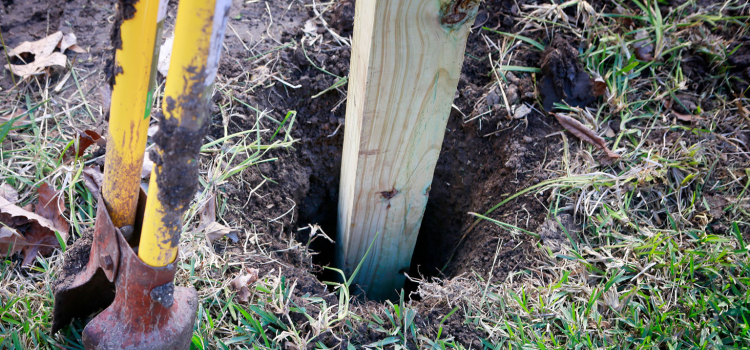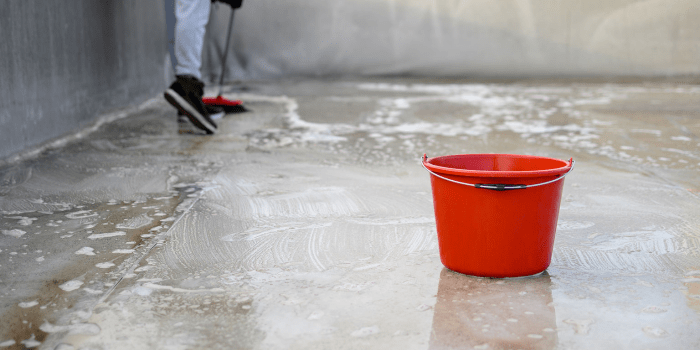With almost 15 years in the concrete placing and finishing industry, I will share with you my advice on how to start a concrete business and mention some of the pros and cons that come with the trade.
Starting a concrete business should be a fun and exciting time, and to make sure you don’t run into any problems along the way, it really does pay to do some research on how to start a concrete business.
There are many things to consider when starting and running your concrete business, and if you do not, you may just find yourself and your new concrete business heading for a world of stress, and an end result of closing the business.
Why Start A Concrete Business

If you have worked with concrete for any length of time you may be ready to go out on your own and start a concrete business of your own.
There can be huge benefits for running your own concrete placing and finishing business.
All the tools, all the gear, huge profits, something to be proud of…
These are all huge motivational steps in wanting to start your own concrete business and by all accounts, I say go for it!
However, there are many aspects of a concrete business that many people overlook, and this can equate to thousands being filtered out in wages, materials, fixing faults, or doing extras for people at the last minute.
In this article, I will explain how to start a concrete business, what to expect when you start, the gear and tools you will need, and some extra things to think about in making your concrete business safe and legal, and covered.
First Steps To Start A Concrete Business
Since you are here I am assuming you have worked with concrete before, or have a team of placers in mind, if not you will need to find experienced concrete placers and finishers.
If you are getting into concrete for the first time, I would recommend finding a mentor, or someone to go and help for a few months first.
Ideally, you will have more than 3 or 4 years placing and finishing concrete floors and pads of all kinds to gain the relative experience needed.
First Steps In Starting A Concrete Business
1 – Think of and design your company name and logo. You can pay someone to do this if you cannot do this yourself.
2 – Types of concrete jobs you will be doing. This is very important as things can very quickly blow out of control and biting off more than you can chew can end up in disaster.
3 – Tools, vehicles, and funding. If you do not have the tool you need to start a concrete business you will need to sort this. There is a basic start-up checklist on the home page of this website you can view to help with this.
You will need transport for your gear, you and the staff if you have any. If you need to get this still, I would recommend doing your first few smaller jobs with the help of someone to get the coin to go and buy one. Not ideal, but if worked right, two or three good-paying jobs may get you enough to get your transport sorted…
Tools can get expensive, but you can start off with all the basics for about $1000, this can grow quickly if you include a power trowel. If you are handy with a trowel and a set of kneeboards you can get going with these, and still finish most jobs to a high standard. ( Smooth finishes )
4 – Insurance and liability cover. If for one reason or another your jobs don’t go as planned, you will NEED liability or job protection cover.
The last thing you need is to place a driveway that gets damaged by frost, or cracks in too much heat, and you have to pay to first break it out and take it away, and then pay to redo the concrete.
Now hopefully you will never have this happen, but I have seen many reasons, excuses, and instances over 15 years of things that can go wrong.
In the end, almost all jobs should be a winner, and this will come with experience.
5 – Office/depot or headquarters. Where are you going to be based from? Gear, materials like boxing, pegs, shudders, mesh and reinforcing rods, etc, take up a lot of space, just be prepared for expansion.
6 – Bookkeeping, wages, financial forecast. In most cases, I would recommend getting an accountant. You will have enough on your plate and this is one huge area you will not have to worry or stress about.
Keep track of your financial forecast so as to further understand where your money is being spent, and how you can get more out of your business.
7 – Advertising your new concrete business. This is only if you are prepared for an increase in work. If you are just starting out I would suggest trying to sort a few jobs by asking around personally, and by general word of mouth. People talk! and if your work is tidy, accurate, and professional, this will almost always bring in an even flow of work.
8 – Have Fun and grow. If you were anything like the company I worked for, the 3 of us quickly became 22, in a matter of months. There is so much workaround for everyone and if your standard of quality is high, you will get work…Trust me!.
If you work your business right and spend your profit growing your business ( To a point ) you will realize the potential a concrete placing and finishing business can have,
Company Name, Logo & Website
Thinking of and finding a company name can be tricky business, but there are a few online tools I use for my online affiliate marketing business that can help you find company names and furthermore the domain name for your company.
A domain name is a website your concrete business will use, you can buy these for about $15 – $50 per year. Normally it will be the same as your company’s business.
To find names I use I go to Godaddy.com
Fiverr is an online platform where you can hire people to make and do almost anything you cannot. Get your logos and style made by a pro!
Jobs start from as little as $5 which is great.
TIP: Be specific when explaining what you are wanting, and add images or links to other websites you may want to mimic the design from.
The Types Of Concrete Jobs For Your Business
We cannot take on all work that we get asked to do, especially if it’s way out of our size, comfort zone, location, or area of expertise.
When getting into the advertising of any kind it’s important to inform people of what you can do for them.
If you have yourself and 1 or 2 workers I would stick to smaller more manageable size jobs like house floors, small sheds, pathways and patios, driveways, etc, and get known for doing these first.
As your business grows, so will your gear, staff, and the size of jobs you can take on. You will also gain further knowledge in the concrete placing and finishing field which will in turn mean you can handle larger jobs.
Concrete Tools, Vehicles, And Funding
- Starting a concrete business does not need to be an expensive process, well not extremely expensive depending on what you can utilize, and your skills. and your network.
If you are lucky enough to start with a van, getting the basic tools to do most concrete work can be done for under $10,000, in fact, one can start a concrete business for under $5,000
If you are handy on a trowel and knee boards, you can take this amount down to about the $2000 mark, with a little left over.
I live in New Zealand and was able to buy the list of tools here.
if I remember correctly the total was just under the $1900 mark.
Concrete Tool Set Up For Under $1000
- Concrete Screeds – The 1.2m screed I already had so I did not need to purchase it. This is with the 1.2m screed included in the complete set of concrete screeds. You can get customer box section lengths if needed. All of my concrete screeds were Ox brand.
1.8m
2.4m
3m
3.6m - Ox Concrete Rakes x2
- Ox Bull float ( I had the extension pole )
- Marshalltown trowel
- Concrete knee boards x2
- Laser level ( Tool Barn Laser level with tripod $999.00 on special from $1299.00 )
- Magnesium Float
- Concrete Groover
Off memory, I think that was all the gear I had to buy.
There is also a tool belt and accessories, sledgehammer, boxing, and pegs, which some of may be included in your first job quote.
most other tools like a concrete vibrator, concrete power floats, etc were hired, borrowed, or bought along the way.
Insurance And Liability Cover
It can be your worst nightmare, a job that just doesn’t go to plan, for whatever reason when you go out on your own you may find yourself in situations you don’t want to be in.
For whatever reason, mistakes, accidents, poor planning, or unpredicted weather can wreck a concrete job, or lower the finished quality or appearance.
It will be up to you to replace the concrete.
Insurance for this kind of cover is very important and is a way of protecting you and your concrete business in the future.
Office And Depot
To start a concrete business you will need somewhere to work from.
It is recommended that any business, online or offline, should have its own office and workspace where you can have a decent system and routine in place with fewer distractions.
Work yards very quickly fill up with leftover timber, boxing, steel, mesh, vehicles, and more.
If you have a routine and system in place, things can run smoother, faster, and with less stress and time wasted sorting and planning your workload.
Office Tips To Start A Concrete Business
1 – Plan your jobs in advance on a calendar. This will give you and your workers time to prepare and mentally prep for the next job.
2 – Quote sheets are ready. I know from personal experience if you can get hold of the prices for materials and have them printed out and put in a clear file, you can look up materials and price jobs accordingly and faster. Once you have more experience in quoting, you can work out the total cost per square meter of work, and then set that as your base charge rate.
3 – Extra work included. This has happened more times than I can remember. People often ask, “Oh can we just do that bit while you are here? Sometimes these little extras can chew up lots of time, materials, and sometimes staff. Extra work that was not included in the quote should be marked as extra and charged accordingly.
4 – I have heard every excuse under the sun for why someone cannot make it to work for the day. Besides you, your staff, and workers are what is going to help you run your concrete business. In my experience, rewards for efforts go a long way. Get fussy when hiring, don’t overwork them, and don’t be greedy when paying your staff. When staff feels overworked and under-appreciated, they will lose interest and potentially look for something else, or worse, switch companies.
5, Keep an in-and-out tray for your paperwork. These trays are important and easy to indicate where you are with your paperwork. You can see exactly which bits of paperwork need to be sorted and filed, and you can also see which ones have been looked at, completed, and filed. So if you get a bill you need to pay, it goes into the inn tray, once paid it can go into the out tray. At the end of the month, the paperwork in the “out” tray can be filed and stored away in a filing cabinet
Book keeping, Wages, Financial Forecast
For most people, this is one side of the business that will be outsourced.
This means getting an accountant to do your accounts, wages, financial forecast, etc.
By doing this you have saved yourself a lot of time and energy and can focus on areas where you are more suited.

Timesheets should be easy to understand and read.
Materials used should be documented and the total hours for each job should be added up so you know which jobs are better value for money, which ones are not worth getting involved in, and which ones need to be priced differently.
Advertising Your New Concrete Business
Word of mouth is great and usually, you can gain lots of work through this method, however, as the business grows you and your workers get more experience and at some time, are keen to expand, grow and take on more work.
This means advertising.
Ways to advertise a business
- Social media platforms like Facebook, Youtube, Tictok, Pinterest, Instagram, etc, can be used for free advertising.
- Radio or other broadcasting.
- Word of mouth.
- Billboards or other signs
- Phonebooks, newspapers, or other printed formats of advertising
- Paid advertising online. PPC advertising ( Pay per click )
There are loads of options in which someone can advertise their business, online or offline, and it all comes down to preference of choice, finances, and how fast you want to grow your business.
Have Fun Along The Way!
I cannot stress the importance of giving yourself a reward here and there for your efforts.
Running a business of any kind takes practice, perseverance, and a lot of self-motivation.
If it’s all work and no play, starting a concrete business and then running one can turn from a fun business adventure to a ball and chain job with no breaks, paperwork for miles, and no means to an end.
Rewards for yourself do not need to be expensive, and even small rewards can go a long way in making you feel it’s all still worth the effort you are putting in.
Summary Of How To Start A Concrete Business
The best way to learn any new skill is to do it hands-on. There will be many moments where you will have to learn as you go and think on your feet.
Practice, take advice, and I cannot stress the importance of having a working system in place.
In the concrete industry, the workday can vary in length so do not expect to work certain hours, you will need to be flexible.
As you grow your new concrete business you can outsource people to run the business for you, which will allow you to take a step back, and reap some of the benefits you started the business for.
More spare time and more money, overall financial freedom, and flexibility
I really do hope this has bought to your attention some aspects of how to start a concrete business and a few extra tips on running your business as well.
As Always any comments or questions can be left below, and I will be sure to read and or reply






